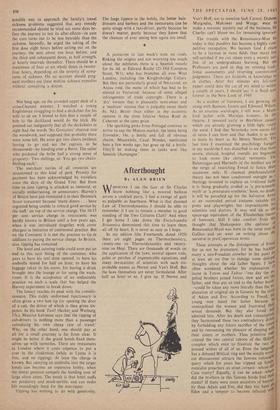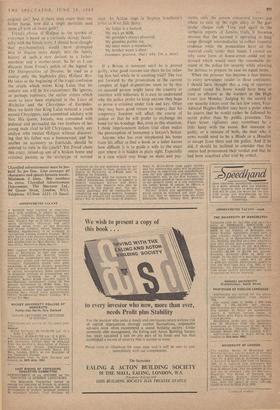Afterthought
By ALAN BRIEN
WHENEVER I see the face of Sir Charles Snow bobbing like a moored balloon across a cocktail party, I feel a twinge of guilt as palpable as heartburn. What is that damned Law of Thermodynamics I should be able to remember if I am to remain a member in good standing of the Two Cultures Club? And when I get home I take down the Encyclopirdia Britannica determined this time to learn them all off by heart. It is never as easy as I hope.
In my edition (the Fourteenth, dated 1929) there are eight pages on Thermochemistry, twenty-one on Thermodynamics and twenty- nine on Heat. There are thousands of words on the application of the laws, several square rods, poles or perches of impenetrable equations, and many invocations of scientists with such im- probable names as Nernst and Van't Hoff. But the laws themselves are never formulated. After half an hour or so, I give up. If Nernst and
Van't Hoff, not to mention Sadi Carnot, Duhem, Margoules, Makower and Waage, want to make a masonic mystery out of the business, Sir Charles can't blame me for remaining ignorant- The trouble with the Renaissance-Man bit. today is that punditry has become a highly com- petitive occupation. We laymen (and I claim to be a layman in more fields than most) feel self-satisfied if we can retain even a wavery out- line of an undergraduate learning. But the Professors are paid to slog on revising tradi- tional assessments and reversing conventional judgments. There are fashions in knowledge as in clothes. After five minutes any full-time expert could date the cut of my mind to within a couple of years. 1 should 'say it is fixed now forever in the New Look of 1949.
As a student of literature. I am grnwing old along with Bateson, Leavis and Edmund Wilson. As an amateur sociologist, I still wear a Mum- ford jacket with Marxian trousers. In the theatre, I invested early in Brechtian casuals which are already growing a little tight round the waist. I find that Stravinsky now seems full of tunes I can hum and that Auden is as easY to learn by heart as Sir Henry Newbolt. The last time 1 examined the psychology hangers in my wardrobe I was disturbed to see that those severe, clinical, hospital overalls are beginning to look more like clerical vestments. The Balenciagas and Hartnells of the intellect are on the verge of restricting Freud to fancy dress, occasions only. If • classical psychoanalytical theory has not been condemned outright as 3 theology invented to explain an irrational faith, it is being gradually eroded as 'a pre-scientific myth' or 'a premature synthesis.' Soon, no doubt, it will be parcelled up for the Salvation ArtilY as an outmoded period costume suitable for 1 poets and playwrights but impracticable for scientists and doctors. It may end up as the space-age equivalent of the Elizabethan theory' of humours. Still I take comfort from the, thought that Shakespeare (the epitome Renaissance-Man) was born in the same year 0 Galileo and yet went on writing about the universe in pre-Copernican terms. These attempts at the dislodgement of Fred (let us not be premature, for he has buckled - many a neo-Freudian crowbar in the past) d°, at least set me free to indulge some disloY3' thoughts about the old father figure. I have, often wondered whether his explanation 0` incest in Totem and Taboo—`one day the ex- pelled brothers joined forces, slew and ate the, father, and thus put an end to the father horde —could be taken any more literally than the a'c' planation of original sin in Genesis by the story of Adam and Eve. According to Freud, the young men hated the father because he monopolised the women and frustrated their sexual demands. But they also loved a°d admired him. After his death and consumption, they harmonised these two contradictory drives by forbidding any future sacrifice of the tot and by renouncing the pleasure of sleeping Wit their sisters or mothers. Thus primitive 013n created the two central taboos of the (Edirtl' complex which exist to frustrate the two r; pressed wishes of all of us. Even the languag, has a debased Biblical ring and the simple vvoci.u; cut denouement attracts the famous rational's query which for years has tripped up fun' id ' mentalist preachers on street corners—whom — Cain marry? Equally, it can be asked—wher.c did the brothers in this famous horde find the'r mates? If there were more ancestors of human r; ity than Adam and Eve, did they too have 3 Eden and a tempter to become infected with
.original sin? And if ,there were more than one father horde, how did a single parricide seed them alt with an incest guilt?
Freud's choice of CEdipus as the symbol of everyman is based on a curiously skimpy famili- arity with the Greek story. I should have thought that psychoanalysis would have prompted him to inquire more deeply into the family history of such. a rare deviant as a father- murderer and a mother-lover. So far as 1 can discover from Freud's précis of the legend in The Interpretation of Dreams, he used as a source only the Sophocles play, CEdipus Rex. He takes as the beginning of the tragic confusion the oracle which warns King Laius that his unborn son will be his executioner, He ignores, or perhaps represses, the earlier events which seem to have been explained in the Laius of iEschylus and the Chrysippus of Euripides. Here we learn that King Laius seduced a youth named Chrysippus, and committed adultery with him. His queen, Jocasta, was consumed with jealousy and persuaded the two brothers of her young male rival to kill Chrysippus. Surely any analyst who treated CEdipus without discover- ing that his father was a homosexual, and his mother an accessory to fratricide, should be ordered to turn in his couch? Yet Freud chose this crazy, mixed-up son of a broken home and criminal parents as the archetype of normal
man. As Action sings in Stephen Sondheim's lyrics to West Side Story: My father is a bastard, My ma's an SOB, . •
My grandpa's always plastered,
My grandma pushes tea.
My sister wears a moustache, My brother wears a dress.
Goodness gracious, that's why I'm a mess!
If a 'Briton is innocent until he is proved guilty, what good reasons can there be for refus- ing him bail while he is awaiting trial? The two put forward by the prosecution in the current complex of legal disputations seem to be that an accused person might leave the country or interfere with witnesses. It is easy to understand why the police prefer to keep anyone they hope to prove a criminal under lock and key. Often they may have good reason to suspect that his temporary freedom will affect the course of justice or that he will prefer to exchange his bond for his bondage. But, even in this situation, think imprisonment before trial often makes the presumption of innocence a lawyer's fiction.
Anyone who has ever telephoned his home from. his office to find a book or a letter knows how difficult it is to guide a wife to the exact spot where it is hidden in plain sight. Especially in a case which may hinge on dates and pay- ments, only the person concerned knows just where to turn up the right diary. Or ?he par- ticular cheque stub. Time and again in the verbatim reports of famous trials, it becomes obvious that the accused is operating , at long 1 range through intermediaries to collect essential evidence while the prosecution have all the material cosily under their hands. I cannot see why some form of house-arrest could not be devised which would meet the reasonable de- mand of the police for security while allowing the defence to prepare its case on equal terms.
When the prisoner has become a face known to every newspaper reader in three continents. I should have thought that a ring of reporters camped round his home would have been at least as efficient as the Warders at the High Court last Monday. Judging by the record of our security forces over the last few years, Vice- Admiral Hughes-Hallett may have a point when he asserts that he would rather be followed by secret police than by public pressmen. The Fleet Street vigilantes may sometimes be a little hasty with the noose. But innocent or guilty, or a mixture of both, the man who is news would need to be a Hinds or a Houdini to escape from them and the police. And if he did, I should be inclined to consider that the omens had pronounced their verdict and that he had been acquitted after trial by ordeal.































 Previous page
Previous page